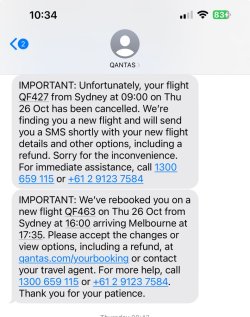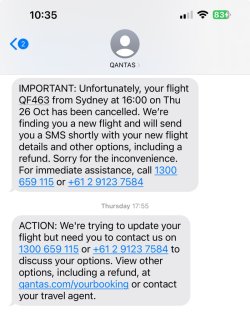BD1959
Established Member
- Joined
- May 11, 2011
- Posts
- 2,361
- Qantas
- Platinum
Unlike the ACCC thread which - initially anyway - looked at the ethos behind Qantas strategically cancelling flights weeks in advance but continued to sell seats on them, I'm hoping to provide a bit of a warning as well as discuss tactical examples of last minute cancellations and options available to us (customers) when this happens.
Twice recently, I've arrived into Sydney only to receive a text (sent overnight) advising me that my onward connection has been cancelled. These things happen, although I suspect that QF is being very aggressive with its flight rationalisation, to not only resolve crewing issues but also to maximise profits. Usually this is not such an issue - afterall QF has perhaps the best network coverage and frequency rate to recover - however the latest incident has really made me question the sanity of QF's (perceived) strategy.
Last Thursday, I arrived into Sydney to be met with the following two text messages:

Yes, that is correct. QF could not accommodate me on a SYD-MEL for a period of 7hrs after my booked flight. This as a WP on a full J fare. Little consequence to QF but of massive consequence to me was the fact that I'd already flown MAN-HEL (10hrs transit), HEL-SIN-SYD and wanted to get home ASAP.
I double-checked and triple-checked with the Check-In desk at SYD Transit - there were NO J seats available until the 463 (at that time) 8hrs later. I was faced with two options:
- I could bide my time in the Sydney J Lounge for an additional 7 hours and (if I understand correctly) apply for EU/UK261 compensation.
- I could voluntarily downgrade to Y and get on any number of flights.
The second option wasn't actually offered, it only came about because I had previously used this as a means to get from SYD to MEL in a similar situation the last time I came back via SYD. I offered this option back to the check-in guy and chose to fly down on the first flight that allowed me a aisle seat in Y - the 10:00am. This had the added benefit of allowing me a shower in the Domestic J Lounge. I was also offered a "voucher" which gave the details of the voluntary downgrade "to help with the fare difference recovery" - though I don't expect that will amount to much.
Now, my suspicion is that QF systematically fills all available J seats with upgrade requests 24-48hrs in the period prior to departure thereby blocking all mitigation for reparation on their (seemingly) regular cancellations. In my instance not even a fully J fare helped since, simply, there were no seats to rebook into.
So the point of this thread ...
What other options are available to passengers when this happens? Does EU261 really apply for the WHOLE of the outbound ticketed journey?
1. Are QF able/Do they look at the ability to travel via intermediary points on inbounds as they would if this was the first leg of an outbound? In this instance flights to Canberra were also cancelled so that ruled out using that route to get home early
2. Should QF look to use other carriers where the delay is so excessive?
3. Given QF's current propensity to cancel/rationalise flights should avoid SYD completely?
4. If EU/UK261 does apply (or if it only applied if the inbound was directly from the EU/UK) isn't QF under a legal obligation to inform passengers of their rights under EU/UK261?
And to those who think cancellations are rare, that I maybe should have just sat back and took the offered QF463 here is a follow-up text I received (despite having already arrived home.

Thoughts on this topic??
Regards,
BD
Twice recently, I've arrived into Sydney only to receive a text (sent overnight) advising me that my onward connection has been cancelled. These things happen, although I suspect that QF is being very aggressive with its flight rationalisation, to not only resolve crewing issues but also to maximise profits. Usually this is not such an issue - afterall QF has perhaps the best network coverage and frequency rate to recover - however the latest incident has really made me question the sanity of QF's (perceived) strategy.
Last Thursday, I arrived into Sydney to be met with the following two text messages:

Yes, that is correct. QF could not accommodate me on a SYD-MEL for a period of 7hrs after my booked flight. This as a WP on a full J fare. Little consequence to QF but of massive consequence to me was the fact that I'd already flown MAN-HEL (10hrs transit), HEL-SIN-SYD and wanted to get home ASAP.
I double-checked and triple-checked with the Check-In desk at SYD Transit - there were NO J seats available until the 463 (at that time) 8hrs later. I was faced with two options:
- I could bide my time in the Sydney J Lounge for an additional 7 hours and (if I understand correctly) apply for EU/UK261 compensation.
- I could voluntarily downgrade to Y and get on any number of flights.
The second option wasn't actually offered, it only came about because I had previously used this as a means to get from SYD to MEL in a similar situation the last time I came back via SYD. I offered this option back to the check-in guy and chose to fly down on the first flight that allowed me a aisle seat in Y - the 10:00am. This had the added benefit of allowing me a shower in the Domestic J Lounge. I was also offered a "voucher" which gave the details of the voluntary downgrade "to help with the fare difference recovery" - though I don't expect that will amount to much.
Now, my suspicion is that QF systematically fills all available J seats with upgrade requests 24-48hrs in the period prior to departure thereby blocking all mitigation for reparation on their (seemingly) regular cancellations. In my instance not even a fully J fare helped since, simply, there were no seats to rebook into.
So the point of this thread ...
What other options are available to passengers when this happens? Does EU261 really apply for the WHOLE of the outbound ticketed journey?
1. Are QF able/Do they look at the ability to travel via intermediary points on inbounds as they would if this was the first leg of an outbound? In this instance flights to Canberra were also cancelled so that ruled out using that route to get home early
2. Should QF look to use other carriers where the delay is so excessive?
3. Given QF's current propensity to cancel/rationalise flights should avoid SYD completely?
4. If EU/UK261 does apply (or if it only applied if the inbound was directly from the EU/UK) isn't QF under a legal obligation to inform passengers of their rights under EU/UK261?
And to those who think cancellations are rare, that I maybe should have just sat back and took the offered QF463 here is a follow-up text I received (despite having already arrived home.

Thoughts on this topic??
Regards,
BD














